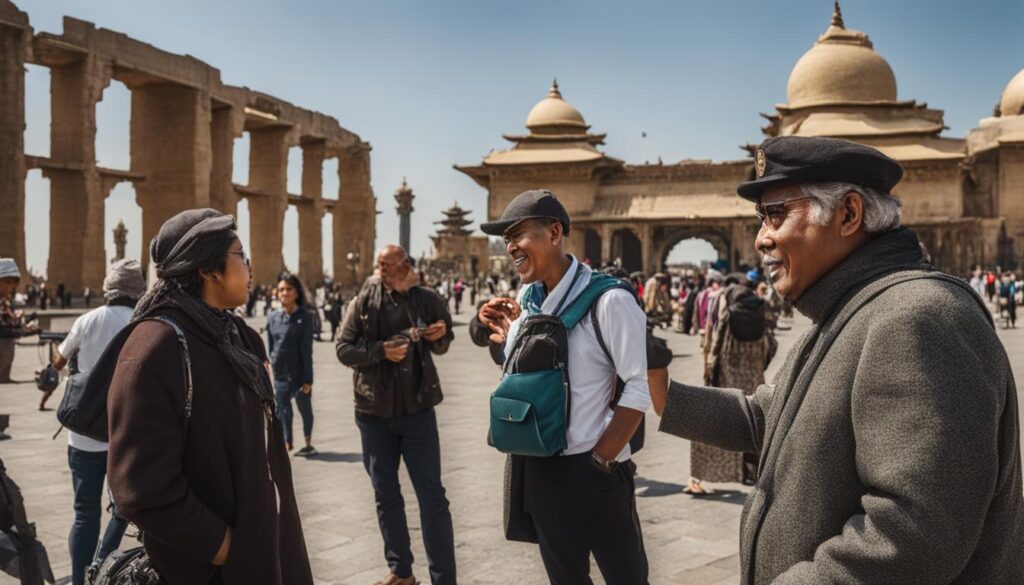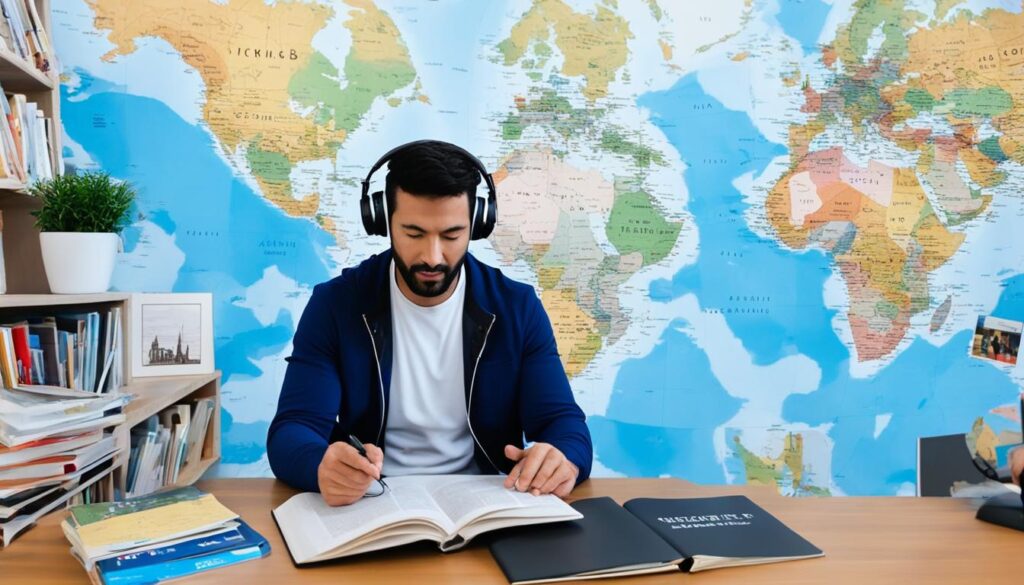Do you love traveling to different countries, discovering new cultures, and meeting new people? While traveling can be exciting, it can also be challenging if you do not speak the local language. Fortunately, by practicing spoken language for travel, you can enhance your travel experiences and unlock a deeper appreciation for local cultures.
Language practice for travel has numerous benefits, including improving your conversational skills, unlocking cultural experiences, and boosting your confidence while traveling. In this article, we’ll explore how practicing spoken language for travel can transform your travel experiences and provide you with practical tips on how to get started.
Importance of Speaking Skills for Travel
Effective communication is essential when traveling abroad, and developing strong speaking skills is crucial. Not only do speaking skills facilitate meaningful interactions with locals, but they also allow you to get the most out of your travel experiences. By learning the language of the country you’re visiting, you can immerse yourself in the culture, gain a deeper understanding of the local customs, and discover hidden gems that you wouldn’t have found otherwise. Taught by knowledgeable instructors, language training programs can also prepare you for real-life situations and boost your confidence in speaking with native speakers.
Moreover, speaking skills can make a huge difference in how local people treat you while traveling. Locals appreciate it when you make the effort to speak their language, and they are often more willing to help and guide you when they see that you’re trying. They are also likely to share stories, tips, and recommendations that tourists don’t usually hear about. With good speaking skills, you can bridge the cultural gap and truly connect with the local community, creating memorable experiences that will last a lifetime.
Language Immersion for Travelers
Immersing yourself in a foreign language is one of the most effective ways to improve your speaking skills for travel. By exposing yourself to the language in real-world situations, you can accelerate your language learning journey and gain more confidence in your abilities.
Language Classes
Language classes are a popular way to immerse yourself in a foreign language. They provide a structured environment where you can learn the fundamentals of a language, build a strong foundation, and practice speaking with other learners. Look for language classes in your local area or online to get started.
Language Exchange Programs
Language exchange programs allow you to connect with native speakers of your target language. Through conversation, you can practice speaking and listening, and gain valuable cultural insights from your language partner. Popular language exchange programs include Tandem and HelloTalk.
Cultural Immersion Experiences
Cultural immersion experiences are another way to improve your language fluency while traveling. Consider participating in a language exchange program abroad, enrolling in a homestay, or joining a volunteer program where you can integrate with the local community and practice your language skills in real-life situations.
Remember, there’s no one-size-fits-all approach to language immersion. Explore different methods and find the ones that work best for you and your travel goals.
Choosing the Right Language Practice Methods
Improving your conversational skills in a foreign language is essential for effective communication while traveling. However, the language practice method you choose can greatly influence the outcome of your language training. Therefore, it’s crucial to find the most suitable methods for your travel goals to maximize your language learning experience.
One of the most convenient ways to practice speaking skills is through conversation practice apps such as Duolingo, Babbel, and Rosetta Stone. These apps offer a structured language learning program and provide instant feedback to help you improve your spoken language skills.
Language partner programs, such as ConversationExchange.com and Tandem, provide another effective language practice method. These programs match you with native speakers who are also looking to practice their language skills. You can communicate online, via voice messages, video calls, or in-person meetups to develop your conversational skills.
For a more immersive language practice method, consider enrolling in a language course in the country you plan to visit. Language schools offer structured language lessons and cultural immersion experiences that can greatly accelerate your language learning journey.
Remember to choose the language practice methods that align with your learning style and language proficiency level for optimal results.
Comparison Table for Language Practice Methods
| Language Practice Method | Pros | Cons |
|---|---|---|
| Conversation Practice Apps | Convenient, structured lessons, instant feedback | May not provide enough speaking practice, limited interaction with native speakers |
| Language Partner Programs | Opportunity for authentic conversations with native speakers, flexible scheduling | May require more time commitment, ineffective if language partners aren’t committed |
| Language Classes | Structured lessons, cultural immersion experiences, opportunity to learn from experts | May be expensive, time-consuming, limited to in-person learning |
Choosing the right language practice methods can make all the difference in your language learning journey, so take your time to research and test different methods before settling on your preferred approach.
Incorporating Language Practice into Travel Planning
When planning your next trip, consider incorporating language practice into your itinerary to fully immerse yourself in the local culture. Here are some tips to help you get started:
Research Language-Specific Resources
Look for language-specific resources that cater to your learning style. This could include language classes, online courses, or language exchange programs.
| Resource Type | Pros | Cons |
|---|---|---|
| Language Classes |
|
|
| Online Courses |
|
|
| Language Exchange Programs |
|
|
Consider the pros and cons of each resource type to find the one that best suits your needs.
Plan Language-Focused Activities
When planning your itinerary, make time for language-focused activities such as language exchanges, attending local events, or participating in cultural tours. These experiences will help you practice speaking and listening skills while immersing yourself in the local culture.
Connect with Local Communities
Connecting with local communities can provide language practice opportunities and lead to authentic cultural experiences. Look for local organizations or groups that cater to language learners and travelers.
By incorporating language practice into your travel planning, you can enhance your communication skills and build confidence in speaking a foreign language.
Overcoming Language Barriers While Traveling
While traveling, effective communication is vital to making the most of your experience. However, language barriers can pose challenges and hinder your ability to communicate with locals in different situations. The good news is that with some practice and patience, you can overcome these barriers and navigate unfamiliar environments with confidence.
If you want to improve your conversational skills for travel, start by investing time in practicing your target language. Utilize conversation practice apps or textbooks to enhance your vocabulary and improve your understanding of grammar rules. With practice, you will gain the confidence to engage in conversations with locals in their native language.
Another effective way to overcome language barriers while traveling is to learn common phrases and expressions that can help you communicate with locals. Phrases like “Excuse me,” “Thank you,” and “Where is the nearest restroom?” can go a long way in establishing goodwill and breaking the ice with locals.
Body language and tone of voice can also play a significant role in effective communication. Learning how to use hand gestures and facial expressions can help you convey your message more clearly, while adjusting your tone of voice can help you express different emotions.
| Practical Tips: |
| 1. Use simple and concise words and phrases. |
| 2. Avoid using slang or regional dialects that may not be well-known. |
| 3. Use visual aids or draw pictures to clarify your point if necessary. |
If you find yourself in a situation where you cannot communicate with a local, do not panic. Instead, try to find an alternative method of communication, such as using a translation app or even drawing pictures to convey your message. Most locals will appreciate your effort to communicate with them, even if your attempt is not perfect.
Remember, practice makes perfect. The more you practice your conversational skills for travel, the more confident you will become in your ability to communicate effectively with locals in different environments. So, embrace the challenge of learning a new language and take advantage of every opportunity to practice your skills.
Maximizing Language Practice Opportunities Abroad
When it comes to practicing spoken language for travel, there’s no better opportunity than immersing yourself in a foreign culture. By interacting with locals and engaging in language exchange activities, you can further develop your language skills and gain a deeper understanding of the local customs and traditions.
To maximize your language practice opportunities abroad, start by seeking out language exchange programs. Websites like ConversationExchange.com and MyLanguageExchange.com can connect you with native speakers who are interested in language exchange. In addition to language exchange programs, consider signing up for language classes or workshops offered in the area.
Another effective way to engage in language practice is by immersing yourself in the local culture. Attend cultural events, visit local markets, and explore the city on your own to gain a deeper understanding of the language and customs. By doing so, you’ll naturally engage with locals and have the opportunity to practice your language skills in real-life situations.
Finally, don’t be afraid to make mistakes and practice your conversational skills with locals. While it may be intimidating at first, practice makes perfect. By engaging in conversations with local residents, you’ll gain the confidence you need to speak a foreign language fluently.
Tips for Engaging in Language Practice Abroad
- Seek out language exchange programs and language classes in the area
- Immerse yourself in the local culture by attending events and exploring the city
- Practice your conversational skills with locals, even if you make mistakes
Building Confidence in Speaking a Foreign Language
Building confidence in speaking a foreign language is an essential aspect of effective communication while traveling. Fluency in spoken language can open doors to unique experiences, cultural understanding, and memorable encounters. If you’re feeling hesitant or self-conscious when attempting to speak a foreign language, don’t worry. There are strategies to help build your confidence and courage when engaging in conversations with native speakers.
Practice, practice, practice
One of the most effective ways to build confidence in speaking a foreign language is through consistent practice. The more you practice, the more comfortable and confident you will feel. Consider taking language classes or finding a language exchange program to improve your speaking skills. Additionally, conversation practice apps and online resources can provide you with the tools to enhance your language proficiency in a low-pressure environment.
Visualize success
Visualizing successful communication in a foreign language can help build your confidence. Before engaging in a conversation, take a moment to visualize yourself speaking confidently and effectively. Imagine yourself receiving positive feedback and compliments from native speakers. This can help alleviate self-doubt and boost your confidence when speaking in a foreign language.
Embrace mistakes
Mistakes are a natural part of the language learning process. Rather than fearing mistakes, embrace them as an opportunity to learn. Native speakers will appreciate your effort and intentions to communicate with them in their language, even if it’s not perfect. When making a mistake, take it in stride and move forward with confidence.
| Do’s | Don’ts |
|---|---|
|
|
Find a language partner
Connecting with a language partner can be an effective way to build confidence in speaking a foreign language. Language partners can provide you with feedback, support, and motivation. In addition, they offer the opportunity to practice conversational skills with a native speaker in a comfortable and relaxed environment. Look for language exchange programs or online resources to find a language partner.
When building confidence in speaking a foreign language, remember that it takes time and effort. Be patient with yourself and focus on progress rather than perfection. With consistent practice and a positive mindset, you can build the confidence and courage to engage in conversations with native speakers and make the most out of your travel experiences.
Continuing Language Practice After Your Travels
Returning home from your travels doesn’t mean your language practice should come to an end. In fact, it’s essential to continue practicing your spoken language skills to maintain and improve your level of fluency. Here are some effective ways to continue your language practice journey:
1. Join a Language Class
Language classes are a great option to continue your language learning post-travel. Not only can they offer structured curriculum, but they also provide the opportunity to practice with other learners, improving speaking skills and expanding vocabulary. Look for local language schools or online classes that cater to your language of choice, schedule, and skill level.
2. Utilize Online Resources
There is no shortage of online resources to practice your spoken language skills. From conversation practice apps to language exchange forums, there are various ways to connect with native speakers and improve your conversational skills. Additionally, online language courses can help you refine your skills at your own pace.
3. Maintain Connections with Language Partners
If you met language partners during your travels, maintaining those connections can be an excellent way to continue your language practice journey. Schedule regular conversations, exchange language-learning materials, and track each other’s progress to stay motivated.
Note: Consistency is key in continuing your language practice journey. Dedicate a few minutes each day to practice your speaking skills, whether it’s through conversation practice, reading, or listening to podcasts in your target language.
Conclusion
By incorporating language practice into your travel plans, you not only enhance your travel experiences but also develop an invaluable life skill. Speaking a foreign language promotes cultural understanding and allows for more meaningful connections with locals. It helps you navigate unfamiliar environments with ease and confidence. Remember, effective communication is the key to a successful trip, and language practice can greatly improve your conversational skills.
Make sure to choose the right language practice methods that align with your travel goals and preferences. Don’t be afraid to immerse yourself in the local culture and seek out language exchange opportunities. Building confidence in speaking a foreign language takes time and effort, but the rewards are worth it.
Even after your travels, keep practicing the language you learned. Utilize online resources and maintain connections with language partners you met during your travels. With continued practice, you can achieve fluency in a spoken language and open new doors to cultural experiences.
Start your language practice journey today and embark on a fulfilling and enriched travel experience.

















































